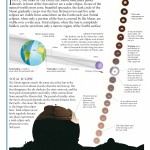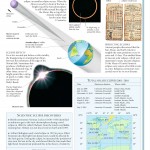In its 27 – day Orbit of the Earth, the Moon sometimes passes directly in front of the Sun and we see a solar eclipse. In one of the natural world’s most eerie, beautiful spectacles, the dark circle of the Moon gradually creeps over the Sun.
Between two and five solar eclipses are visible from somewhere on the Earth each year.
When the Moon is at its farthest from the Earth, it is not big enough in the sky to cover the Sun completely during an eclipse. Instead of a total eclipse, an annular eclipse occurs. When the Moon is exactly in front of the Sun, a bright ring of the Sun’s photosphere is still visible around the edge of the Moon.
Related posts:
The positions of planets at the time of your birth are determined first. This forms the birth data. Your birth data is then compared to the positions of planets at various stages in life, to predict your future and major events that could happen in your life.
Vostok 1 (Russian: Восток-1, East 1 or Arrange 1) was the first spaceflight in the Vostok system and the first human spaceflight in history. The Vostok 3KA space apparatus was started on April 12, 1961. The flight took Yuri Gagarin, a cosmonaut from the Soviet Union, into space. The flight checked the first time that a human dropped in space, and in addition the first orbital flight of a manne...
The actual Sloppier things are a set of huge things listed from the People from France astronomer Charles Untidier in his "List diethylstilbestrol Nebulousness et diethylstilbestrol Amas d'Étoiles" ("Catalogue of Formulations and Super legend Clusters"), initially released within side 1771, with the final inclusion (according to Messier's observations) manufactured in 1966.
Neptune is the eighth and most distant planet from the Sun in the Earth's planetary group. It's the fourth-most expansive planet by distance across and the third-most vast by mass. Neptune is 17 times the mass of Earth and is to some degree more enormous than its close-twin Uranus, which is 15 times the mass of Earth but not as dense. On normal, Neptune circles the Sun at a separation of 30...
Scratches is presently accommodate to five working shuttle: several in circle—the Scratches Odyssey, Scratches Express, and Scratches Surveillance Orbiter; and two on the surface—Scratches Investigation Wanderer Opening and the Scratches Science Research facility Interest. Old space apparatus on the surface incorporate MER-A Spirit, and a few different idle landers and meanderers, both on trac...
The planet Jupiter has 67 affirmed moons. This gives it the most substantial entourage of moons with "sensibly secure" circles of any planet in the Sun oriented System. The most monstrous of them, the four Galilean moons, were identified in 1610 by Galileo Galilei and were the first protests recognized to circle a figure that was not Earth or the Sun. From the close of the 19th century, handfu...
ISS, which is as big as a football field and cost $60 billion, houses six astronauts at the moment. The space station, whose weight is 350 tons, might as well be in operation until the 2020s. After the retirement of American space shuttles it will basically depend on Russian spaceships.
Black holes are prisons of Light, where gravity is so strong that nothing can escape. But they have even more bizarre effects: a block hole’s gravity distorts space and time, and the laws of physics break down at its center. No one can look inside a black hole, but mathematicians can explore them using Einstein’s theory of gravity. Objects that fall into a black hole are ‘spaghettified...
In stargazing and travel, the divine circle is a nonexistent circle of subjectively extensive span, concentric with the spectator. All questions in the onlooker's sky could be considered as extrapolated upon within surface of the heavenly circle, as it would be if it were the underside of an arch or a hemispherical screen. The divine circle is a useful apparatus for round cosmology, permitting spe...
Space messages tell about the biosphere, that includes the basic chemical compositions of the continents, oceans and atmosphere. The highest and lowest points of Earth and the surface strength of gravity are also listed in the space messages. Along with the relative sizes and ordering of the planets in our solar system, this message tells about the mass and radius of both our Sun and Jupiter. ...
The divine circle might be acknowledged to be interminable in sweep. This denotes any focus within it, incorporating that involved by the spectator, might be recognized the inside. It moreover indicates that everything parallel lines, be they millimeters separated or crosswise over the Earth's planetary group from one another, will appear to cross the circle at a lone indicate, comparable to the v...
Earth and the different several internal planets of our earth's planetary group (Mercury, Venus and Scratches) are causing of rock, to be containing regular minerals like feldspars and metals like magnesium and aluminum. So is Pluto. The different planets are not unyielding. Jupiter, case in point, is made up generally of trapped helium, hydrogen, and water. In our earth's planetary group, the...
The geologic time scale blankets the degree of the being of Earth, from around the range of 4600 million years in the past to the present day. It's stamped by Worldwide Limit Stereotype Areas and Indicates. Geologic time units are (in place of slipping specificity) ages, times, periods, ages, and develops; and the relating chronostratigraphic units, which measure "shake-time", are endotherms, eryt...
When a Metorite collides with Earth it can form an impact crater – a bowl – shaped hollow in the Earth’s surface. Space rocks have produced in this way throughout Earth’s life, especially when the planet was young, about 4 billion years ago. Space rocks do not have to hit Earth to have a devastating effect. On june 30, 1908, there was an explosion 3.5 miles up in Earth’s atmosphere, above...
The Lunar Module basically consists of many electronically connected parts that helps the Module complete. It mainly consists of the Docking Window, The Antenna to receive and send the signals, the Docking Lights, The Tracking Light, The Forward Hatch, The Mesa, The Ladder to get into the Module, the Egress Platform, The Rover, The Landing Probe, the Overhead Hatch, the Docking Target, the Eva...
Saturn is the sixth planet from the Sun and the second most expansive planet in the Earth's planetary group, following Jupiter. Named following the Roman god Saturn, its galactic image (♄) speaks for the god's sickle. Saturn is a gas mammoth with a middle range something like nine times that of Earth. While one and only one-eighth the mean thickness of Earth, with its more impressive volume Sa...
The process of existence or initiative of life in the Solar System looks very interesting. Life in the solar system is a monomeric nucleotide, pretty much just a simple molecular compound made out of a normal, every-day inorganic material. Life started in the Earth once the things inside it are cooled down a bit. Basically life in the Earth is a replicator, the way it just happened or formed. Life...
NASA has decided that the MPCV, or Multi-purpose Crew Vehicle, will be America’s next crewed spacecraft following the retirement of the space shuttle. The MPCV program is a refocus of the Orion Crew Vehicle Program, which has been in development since 2005.



 Upload your infographic here and contribute to our community.
Upload your infographic here and contribute to our community. 
Leave a Reply